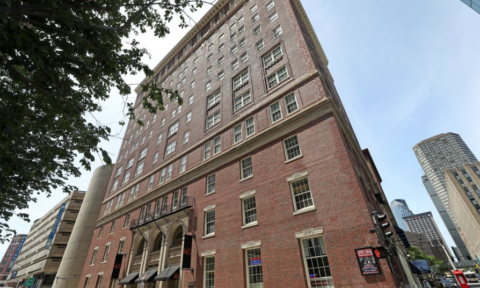Boston Globe
By Tim Logan
December 11, 2020
Developers are set to file plans Friday to convert it into 210 apartments at the corner of Clarendon and Stuart streets.
The longtime home of Boston’s YWCA will soon get a new life as affordable housing in one of the city’s swankiest neighborhoods.
Developers Beacon Communities and Mount Vernon Co. are set to file plans with the city Friday to convert the 13-story building at the corner of Clarendon and Stuart streets in the Back Bay into a 210-unit affordable housing development, with nearly half set aside as permanent supportive housing for formerly homeless people. They’ll keep current tenants — including the Snowden International School and the Lyric Stage theater — and will partner with the Pine Street Inn to provide counseling and other services for residents.
And perhaps most crucially, said Beacon CEO Dara Kovel, they’ll maintain the building’s historical use as a community hub while providing affordable housing in a part of the city where it’s in short supply.
“That’s important,” she said. “This will ensure for a long time that there will be diversity in this neighborhood.”
It’s a project that likely wouldn’t have happened if not for the COVID-19 pandemic.
YW Boston, as the YWCA is now known, put the building on the market in the summer of 2019, hoping to capitalize on the hot real estate market to secure its financial future. By early this year, the nonprofit had a deal in place with a different developer, who had hoped to upgrade its 66-room hotel and convert some of its apartments into higher-end units. Then the pandemic hit, and financing dried up for hotel and luxury housing developments. The deal fell apart.
Enter Beacon, a veteran Boston affordable housing developer, and Mount Vernon, a large market-rate landlord that recently converted another YWCA in the South End into the Revolution hotel. They’d partnered on an offer on the project originally, but were outbid. So they came back with a new plan: Make the building entirely affordable, financed with an array of federal and state loans, along with tax credits and city-allocated vouchers.
The new offer was “substantially discounted” from YW’s original price, Kovel said, but — with the support of Mayor Martin J. Walsh — the financing was solid. Last month, YW’s board approved a purchase and sale agreement, with the deal to close next year.
“Covid has created a window for opportunities like this for affordable housing,” said Mount Vernon chairman Bruce Percelay. “It’s a unique situation.”
Neither party would disclose a sale price — though Kovel said she expects the purchase and renovation combined will cost $108 million — but YW CEO Beth Chandler said the proceeds would allow her organization to focus on its mission, which has evolved over the years from providing housing and classes for young women arriving in Boston to leading racial and social justice training that largely happens offsite.
“We’re thrilled. We think this is a great partnership,” Chandler said. “We don’t have to think anymore about managing a building and, given all that’s going on in the world, we can focus on the work we need to do.”
Like the building’s commercial tenants, YW Boston will keep its office space in the building; Kovel said she expected those spaces will be able to stay open while residential units upstairs are renovated. Hotel 140, as the 66-unit hotel is known, will close and be converted to apartments. About 100 units will be set aside as supportive housing for formerly homeless people, with services run by the Pine Street Inn, similar to a project that the nonprofit is codeveloping in Jamaica Plain.
The renovation won’t change the historic exterior of the 13-story brick building across Stuart Street from Boston’s tallest skyscraper — 200 Clarendon — and down the block from a glassy 33-story condo tower now under construction. But Beacon plans to upgrade the roof, elevators and other systems, and will add bathrooms to the many single-room-occupancy units that don’t currently have them. Friday’s filing with the Boston Planning & Development Agency was an initial letter of intent. More detailed plans, likely to come in several weeks, will then kick off community review. Kovel said she hopes work can start in the fall and finish in mid-2023.
She said the project is a rare chance to add high-quality housing for low-income people in the increasingly expensive core of the city. Many other buildings like this one have sold at huge prices in recent years. But the pandemic provided a chance to do something that otherwise might not have been financially feasible.
“The world fell apart, and we took that opportunity,” Kovel said. “If luxury hotels and apartments aren’t working right now, maybe affordable housing will.”

